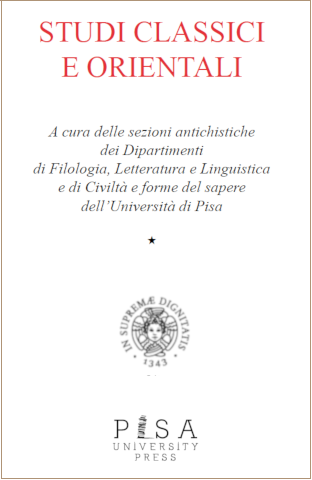Assuefazione ai modelli e parenesi morale: studio sul lessico del pensiero nei discorsi di Isocrate volgarizzati da Giacomo Leopardi
Abstract
Developing customs based on models and ethic exhortation: a lexical study of the thought in Isocrates discourses translated by Giacomo Leopardi.In Zib. 3471 ss. Leopardi marks the difficulties in translating ancient texts due to the primary role the style occupies in them. Leopardi’s interest in Isocrates concerns both language and moral purposes of the ancient prose, as the selection of the works he translated reveals. Under the title Operette morali d’Isocrate he includes: Ad Demonicum, Nicocles, Ad Nicoclem, Areopagiticus. In analysing Leopardi’s translations, the essay aims at scrutinizing Isocrates’ role in the Athenian culture during IVth century B.C, while verifying the considerations expressed in the Zibaldone (where the rhetor is compared with sophists and Socrates as well). The study focuses on the words relating to thought and reasoning (φρόνησις, διάνοια, γνώμη, νοῦς and λογισμός), in order to scrutinize the conceptual principles of Isocrates’ use of exempla. The meaning of such words is hard to describe univocally, this is why Leopardi prefers to employ dittologies and periphrases. Isocrates does not seek a specific lexicon to describe the intellect or distinguish the different faculties of the psyche. Isocrates was probably aware of Socratic teaching, but he is far from Plato’s inquiry of philosophical truth. Leopardi’s attention turns to Isocrates in a similar guise as Socrates, that is a «half-philosopher» («mezza filosofia», Zib. 1360), in actual fact the highest fulfilment of moral philosophy. Seen in this perspective Leopardi, I argue, stresses the relevance of Isocrates’ style, for his endeavour to develop rhetorical and moral examples for his pupils and shape their minds.
Pubblicato
2018-08-06
Fascicolo
Sezione
Articoli


